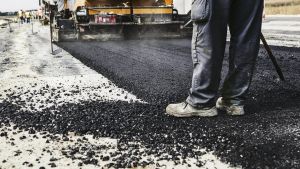What kind of surface is best for road construction in India? Well, the answer depends on the traffic volume and the load that the road will have to undergo. Apart from traffic volume, weight load, and various weather types and temperature of an area, some factors are also behind different types of road surfaces.
Types of Road Surfaces
Read below the must know types of pavements, along with their pros and cons:
1.Asphalt Roads
Asphalt is the most well-liked type of road surface. In the asphalt paving technique, a layer of the mixture is laid on top of a gravel base. Asphalt pavement is constructed where roads have high traffic.
Pros:
- It can be applied quickly and easily
- It dries fast
- The pavement produces less noise
- It is easy to repair and less maintenance
- It is recyclable
- Less costly than other materials
- It is durable and lasts for more than 40 years
Cons:
- It is less strong than other types of road surfaces
- It has toxic elements that are harmful to nature
- Too much load and heavy traffic can make the road’s surfaces wear
- The pavement can get damaged in wet conditions
2. Bitumen Roads

Bituminous seals are used for a surface that has less traffic and minimum loads. The other techniques that come under bituminous are chip sealing, thin membrane, and Otta sealing. A bitumen emulsion is sprayed over the aggregate base to construct a hardy and a sealed surface.
Pros:
- It is waterproof and dust-free
- It is less costly than Asphalt
- It has a five-year maintenance cycle
- It is more long-lasting than gravel
Cons:
- It is less long-lasting than Asphalt
- The bituminous road surface can crack in hot weather
- It is a rough surface that increases road noise
- It is much costlier than gravel
3.Concrete Roads
 Concrete surface roads are usually seen in local road constructions. It is built from a mixture of cement, fly ash, and additional chemical mixtures. The concrete is laid upon a surface in a continuous layer. There are three types of concrete road surfaces: JPCP, JRCP, and CRCP. All these types have different features that help the road surfaces prevent forming cracks.
Concrete surface roads are usually seen in local road constructions. It is built from a mixture of cement, fly ash, and additional chemical mixtures. The concrete is laid upon a surface in a continuous layer. There are three types of concrete road surfaces: JPCP, JRCP, and CRCP. All these types have different features that help the road surfaces prevent forming cracks.
Pros:
- It has a long life capacity
- It consumes 20% less fuel
- The process is quite eco-friendly
Cons:
- It has a rigid surface that is prone to cracks
- It is costlier than Asphalt
- It becomes slippery in wet conditions
- It has high maintenance
4.Composite Roads

Composite road surfaces are a combination of Asphalt and concrete. Sometimes, Asphalt overlays are placed upon a damaged pavement, to form a new hard surface over it. Composite roads are made for roads related to maintenance, recycling, or when rehabilitating an existing road.
Pros:
- The strength of the road is increased
- It costs very little than other methods
- Prevents the road from freezing and evaporates water from the surface
- Good for the environment
Cons:
- Its structural base can be weak

5.Gravel Roads
Grave road surfaces contain low maintained materials. It is practical and affordable, as well. Gravel roads are perfect for rural areas, with a low traffic ratio and lightweight vehicles. Gravel is compacted on freshly cut roads.
Pros:
- It is an affordable and low-cost way of constructing roads
- It is easy to maintain
- It is a great way to preserve the rural ambiance of the roads
Cons:
- It generates a lot of dust
- It can become a mess in wet seasons
These were the types of road surfaces that are usually seen around in India. If you loved this article, do not miss reading our other articles.
For road constructions, maintenance, and infrastructure constructions, please feel free to contact Sahas Infra.


